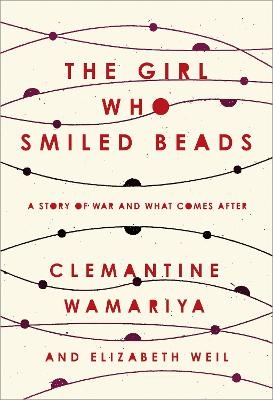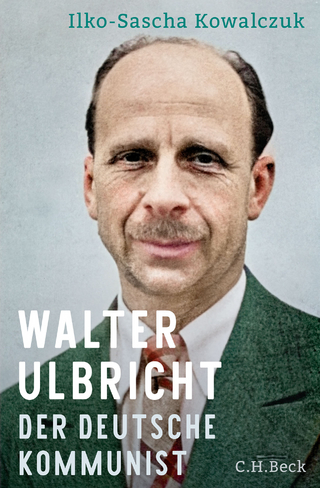
The Girl Who Smiled Beads
Crown Publishing Group, Division of Random House Inc (Verlag)
978-0-525-57437-8 (ISBN)
- Titel ist leider vergriffen;
keine Neuauflage - Artikel merken
Clemantine Wamariya was six years old when her mother and father began to speak in whispers, when neighbors began to disappear, and when she heard the loud, ugly sounds her brother said were thunder. In 1994, she and her fifteen-year-old sister, Claire, fled the Rwandan massacre and spent the next six years migrating through seven African countries, searching for safety perpetually hungry, imprisoned and abused, enduring and escaping refugee camps, finding unexpected kindness, witnessing inhuman cruelty. They did not know whether their parents were dead or alive.
When Clemantine was twelve, she and her sister were granted refugee status in the United States; there, in Chicago, their lives diverged. Though their bond remained unbreakable, Claire, who had for so long protected and provided for Clemantine, was a single mother struggling to make ends meet, while Clemantine was taken in by a family who raised her as their own. She seemed to live the American dream: attending private school, taking up cheerleading, and, ultimately, graduating from Yale. Yet the years of being treated as less than human, of going hungry and seeing death, could not be erased. She felt at the same time six years old and one hundred years old.
In The Girl Who Smiled Beads, Clemantine provokes us to look beyond the label of victim and recognize the power of the imagination to transcend even the most profound injuries and aftershocks. Devastating yet beautiful, and bracingly original, it is a powerful testament to her commitment to constructing a life on her own terms.
lt;b>Clemantine Wamariya is a storyteller and human rights advocate. Born in Kigali, Rwanda, displaced by conflict, Clemantine migrated throughout seven African countries as a child. At age twelve, she was granted refugee status in the United States and went on to receive a BA in Comparative Literature from Yale University. She lives in San Francisco.
Elizabeth Weil is a writer-at-large for The New York Times Magazine, a contributing editor to Outside magazine, and writes frequently for Vogue and other publications. She is the recipient of a New York Press Club Award for her feature reporting, a Lowell Thomas Award for her travel writing, and a GLAAD Award for her coverage of LGBT issues. In addition, her work has been a finalist for a National Magazine Award, a James Beard Award, and a Dart Award for coverage of trauma. She lives in San Francisco with her husband and two daughters.
***This excerpt is from an advance uncorrected copy proof***
Copyright © 2018 Clemantine Wamariya and Elizabeth Weil
The night before we taped the Oprah show, in 2006, I met my sister Claire at her apartment in a public housing unit in Edgewater, where she lived with the three kids she d had before age twenty-two, thanks to her ex-husband, an aid worker who d pursued her at a refugee camp. A black limo arrived and drove us to downtown Chicago, to the Omni Hotel, where my sister used to work. I now can t think about that moment without also thinking about my own naïveté, but at the time all I felt was elated.
I was eighteen, a junior at New Trier High School, living Monday through Friday with the Thomas family in Kenilworth, a fancy suburb. I belonged to the church youth group. I ran track. I d played Fantine in the school production of Les Misérables. I was whoever anybody wanted me to be.
Claire, meanwhile, remained steadfast, herself, a seemingly rougher bargain. Unlike me, she was not a child when we got resettled in the United States, so nobody sent her to school or took her in or filled her up with resources piano lessons, speech therapists, cheerleading camp. Claire just kept hustling. For a while she made a living throwing parties, selling drinks and hiring DJs who mixed American hip-hop, the Congolese superstar Papa Wemba, and French rap. But then she learned it was illegal to sell liquor without a license and she started working full-time as a maid, cleaning two hundred hotel rooms a week.
All I knew about the show we were taping was that it was a two-part series: the first segment showed Oprah and Elie Wiesel visiting Auschwitz, God help us; the second featured the fifty winners of Oprah s high school essay contest. Like the other winners, I had written about Wiesel s book Night, his gutting story of surviving the Holocaust, and why it was still relevant today. The book disarmed me. I found it thrilling, and it made me ashamed. Wiesel had words that I did not have to describe the experiences of my early life.
I d dictated my essay to Mrs. Thomas, as she sat in her tasteful Midwestern house gracious lawn, mahogany floors at a huge old computer that took up the whole desk. Clemantine, she d said, you have to enter. I just know you ll win. Mrs. Thomas had three children of her own, plus me. I called her my American mother and she called me my African daughter. She packed my lunch every day and drove me to school.
In my essay I said that maybe if Rwandans had read Night, they wouldn t have decided to kill one another.
On the way to downtown Chicago, Claire and I had the inevitable conversation is this happening? This is so weird which was as close as my sister and I got to discussing what
had happened to our lives. If we absolutely had to name our past in each other s presence, we d call it the war. But we tried not to do that, and that day we were both so consumed by all the remembering and willful forgetting that when we arrived at the Omni and the bellhop asked, Do you have any bags? we realized we d left all our clothes at home.
Claire took the L back to her apartment, where a friend was watching her children Mariette, who was almost ten; Freddy, who was eight; and Michele, who was five. I stayed in the hotel room, lost.
Harpo Studios gave us each a $150 stipend for dinner. It was more than Claire s monthly food stamp allowance. When Claire returned we ordered room service. We woke at 4:00 a.m. and spent hours getting dressed.
That day,
| Erscheinungsdatum | 12.04.2018 |
|---|---|
| Zusatzinfo | 1 MAP |
| Verlagsort | New York |
| Sprache | englisch |
| Maße | 127 x 203 mm |
| Gewicht | 290 g |
| Themenwelt | Literatur ► Biografien / Erfahrungsberichte |
| Literatur ► Briefe / Tagebücher | |
| Literatur ► Romane / Erzählungen | |
| Geschichte ► Allgemeine Geschichte ► Zeitgeschichte | |
| Geisteswissenschaften ► Geschichte ► Regional- / Ländergeschichte | |
| Sozialwissenschaften ► Politik / Verwaltung | |
| Sozialwissenschaften ► Soziologie | |
| Schlagworte | Africa • African authors • African folklore • African History • African memoirs • autobiographies • Autobiography • autobiography books • best book club books • best books for book clubs • Bestseller • bestselling memoirs • Biographies • Biographies and Memoirs • biographies of famous people • Biography • black authors best sellers • book club recommendations • books about trauma • books by black authors • Elie Wiesel • Female authors • Folktales • gifts for history buffs • Girl • History books • Immigrants • immigration books • Memoir • memoir books • Memoirs • memoirs best sellers • New York Times Bestseller • nonfiction books • Oprah Winfrey • Overcoming Trauma • Refugee • refugee books • refugee camps • Refugees • Rwanda books • Rwanda genocide books • Rwandan genocide books • Sociology • sociology books • Trauma • war • war books • women of color authors • World History |
| ISBN-10 | 0-525-57437-9 / 0525574379 |
| ISBN-13 | 978-0-525-57437-8 / 9780525574378 |
| Zustand | Neuware |
| Haben Sie eine Frage zum Produkt? |
aus dem Bereich


